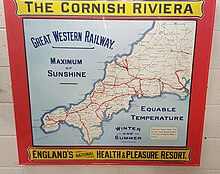This article's factual accuracy may be compromised due to out-of-date information. (June 2012) |


The economy of Cornwall in South West England is largely dependent upon agriculture, followed by tourism. Cornwall is one of the poorest areas in the United Kingdom with a GVA of 70.9% of the national average in 2015.[1] It is one of four areas in the UK that qualified for poverty-related grants from the EU.[2] Farming and food processing contributed £366 million to the county's economy in 2006, equal to 5.3% of Cornwall's total GVA.[3] The agriculture industry in Cornwall employed 9,500 people (4.9% of all Cornish employees) as of 2011. 23,700 more (12.1% of all Cornish employees) were employed in the food industry in Cornwall.[4][3] The Cornish economy also depends heavily on its successful tourist industry, which contributes 12% of Cornwall's GDP[5] and supports about 1 in 5 jobs (19% in Kerrier, Restormel and Scilly, 24% in Penwith, 23% in North Cornwall, 22% in Carrick and 14% in Caradon).[6] Tourism contributed £1.85 billion to the Cornish economy in 2011.[5]
- ^ "Regional gross value added (income approach), UK: 1997 to 2015". Office for National Statistics. 15 December 2016. Retrieved 23 March 2018.
- ^ Whitehouse, Richard (3 October 2019). "28 Cornwall projects funded by the EU as Brexit looms". cornwalllive. Retrieved 18 July 2020.
- ^ a b "Cornwall County Council & Cornwall and Isles of Scilly Economic Forum" (PDF). S3.amazonaws.com. Retrieved 18 March 2019.
- ^ "A review of Cornwall's Agrifood industry 2011" (PDF). Cornwallac.org. Archived from the original (PDF) on 5 March 2016. Retrieved 27 July 2015.
- ^ a b "Tourist earnings top £9bn in Devon and Cornwall". Western Morning News. 21 December 2012. Archived from the original on 14 June 2015. Retrieved 3 September 2016.
- ^ "Annex 2 – Cornwall's Challenges and Concerns – The Evidence Base – Tourism in Cornwall". 15 June 2008. Archived from the original on 15 June 2008.